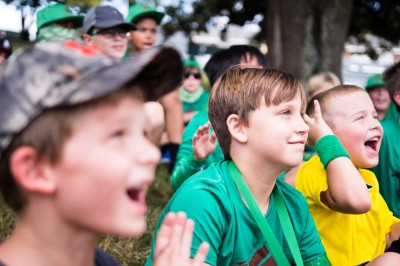10 things to know about summer camp safety (it’s more than just knives and matches)

Your little darlings are going off to summer camp. That’s great! You need a break and they need an adventure. At camp, they will learn water safety, boating safety, fire safety, knife safety and maybe even gun safety. But what about people safety? With adults you’ve never met and dozens of children from unknown backgrounds, people are more of a risk than guns and knives.
As with any organization that works with children, camps have inherent risks. But there are ways to minimize those risks. Here are 10 questions to consider when looking at a summer camp:
1. Does the camp align with your moral and theological values? Why are your moral and theological values important? Depending on their religious background, camps may take positions on gender and political issues. And your child’s experience may be more positive if the camp’s values are consistent with your family’s. If your child is a religious minority at school, common values can be a welcome change.
2. Does the camp screen and train all adult workers for child safety, both employees and volunteers? This one almost goes without saying … almost. Protecting children goes beyond just background checks. You want to have confidence that all employees have been properly screened and trained. Ask about the screening and training process: the camp should be able to answer your inquiries with confidence.
3. Does the camp have policies on appropriate behavior for adults towards children and between children? Does this include restrictions on a child being alone with an adult or another child? Look for “safety regulations” — for example, a “Rule of Two” where no adult is ever alone with a child. Or policies regulating what is appropriate (or inappropriate) conversation with children. For example, most camps would consider discussing the most recent Tarantino movie an inappropriate conversation with a nine-year-old. As with screening, camp personnel should be able to clearly articulate these standards.
4. Are there conduct guidelines for inappropriate language and bullying? Bullying is a lot like mold in a public bathroom: if you’re not actively combating it, it’s going to overrun the environment. You need to be assured that the camp is aware of this and is confronting issues related to verbal and physical harassment.
5. Are there safeguards around internet access, including for phones? The internet is a scary place. Even if the camp personnel themselves have the squeakiest and cleanest browsing history, outside devices (such as friends’ phones) can expose children to adult ideas they’re not ready for, and worse. This is preventable if camp personnel take the time to safeguard internet access on all devices. And if your child’s phone is not already secure, make that a top priority!
6. Does the camp have a good reporting and response policy for accidents or incidents? Are children taught where to go if they have concerns? This is where many organizations fail. They may have the best policies, prevention, and security in place, but if not coupled with a system for reporting and response, it’s not going to do much good. Camps need to plan to prevent crisis, and also a plan to respond. And these plans need to be communicated in an age-appropriate way to the children they safeguard.
7. What age-appropriate guidelines and limitations are in place in terms of child activities or where they can go? Most likely the camp will not have a 6-year-old attempt a class 4 whitewater rapid. But what about going into the kitchen? Or the rec room at the camp office? Or to make life really complicated, what about the girls’ restroom? It’s important to know how the camp guides child activities.
8. How are children lodged and appropriately supervised at night? Are they separated by biological gender and age? For example, are boys allowed into the girls’ cabins after dark? Having properly supervised “safe spaces” is an important part of making sure no child-on-child misconduct occurs. Proper supervision and security are also part of making sure that children are protected from potential child abuse.
9. Does the camp gather appropriate information from parents for emergency contact, health issues, and medical care? This one is basic but critical. If there is a medical emergency, this information is going to be “need to know.”
10. What is the policy around transporting children in cars or other vehicles? The principle that no adult should be alone with a child also applies to transportation. And the camp needs to ensure the “chauffer” is a qualified driver.
These questions will help you determine if the camp is fully prepared to keep your child safe. Camps should be friendly and open about providing these and other policies. Your child should feel secure, and your child should be secure. That security is part of creating cherished, life-long memories.
Theresa Lynn Sidebotham is the Founder of Telios Law, PLLC. She assists organizations in the U.S. and internationally, with a special focus on employment law, religious and nonprofit law, and child safety. She also advises on and conducts numerous misconduct investigations.
David Sidebotham is a founding member of Telios Teaches with over a decade of experience in curriculum management. He takes attorney-generated curriculum and translates it into online courses that are accessible to all learners, while still remaining informative to learners who may be subject matter experts themselves. Telios Teaches includes both sexual harassment and child protection training.




















